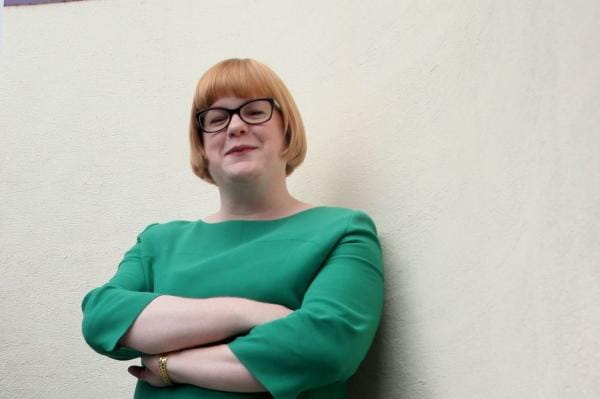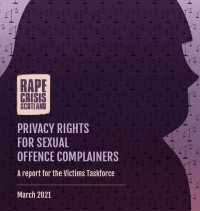News

Working For Survivors
Content Note: Contains screenshots of abusive tweets.
Rape Crisis Scotland is Scotland’s leading organisation working to transform attitudes, improve responses and ultimately to end rape and sexual violence in all its forms. Our helpline is open to anyone – including women, trans and non-binary people, men and boys – affected by sexual violence. Access it nightly from 6pm – midnight on 08088 01 03 02, text on 07537 410 027 or email support@rapecrisisscotland.org.uk.
Accessing support is – for many survivors – a daunting and difficult thing to do. We think that all survivors should be supported to access specialist services when they are ready and that these should be available at the point of need.
Sexual violence is a gendered and has a disproportionate impact on women and girls; our services reflect that. Women only spaces are a core principle of the Rape Crisis movement and upheld through our National Service Standards (read these here). These spaces include women with a diverse range of lived experience and views, including trans women and girls.
Over the weekend we became aware of coordinated and harmful claims circulating about Rape Crisis services in Scotland, stemming from a twitter thread that questioned the provision of women-only spaces in Rape Crisis Centres.
Fuelling misinformation about what support looks like, and what can be expected from support services, is harmful and creates a barrier to accessing support. It is deeply regrettable that some see fit to do this. We hear often from survivors that engaging with Rape Crisis support saved their life, and we would urge people fearmongering about services to consider the impact that dissuading people from accessing support has on survivors. This is not compatible with our view of a feminist Scotland.
We engage, and will continue to do so, in good faith conversations about what support Rape Crisis offers, and what that support looks like in practice, because it helps survivors to know what to expect when they reach out. While we normally refrain from commenting on the abuse we receive on social media, to focus on our vital work, we are responding here to reiterate the principles that guide our work in supporting survivors.
- The core value that underpins all Rape Crisis support is of being non-judgemental. We meet every survivor who engages with us, whether through a one-off helpline call or continued local support, as an individual and work with them to establish their needs, and how best to work with them to come to terms with what has happened and move forward after sexual violence.
- Our services are trauma informed. This means that we work collaboratively and are non-directive – we won’t ever tell someone what to do, or what not to do – to restore a survivor’s sense of control over their own journey. Rape Crisis workers across Scotland understand trauma, the many ways in which it can manifest, and work with compassion and dedication to meet the needs of survivors. This is vital, life-saving work.
- We are feminist. Our work is underpinned by a feminist understanding of violence and inequality and our services are committed to being women-led and the provision of women only spaces and services. We are proudly diverse, intergenerational and inclusive and strive to ensure that all survivors in Scotland receive the response and support that they need and deserve.
For some time now Rape Crisis Scotland have been subject to targeted campaigns of mis and disinformation that distort the reality of specialist service provision. Oftentimes this has incited significant abuse, of which we offer examples at the bottom of this post.
We have invested significant capacity in trying to respond to these attacks – to offer reassurance about the reality of Rape Crisis provision, our ethos and values and commitment to supporting survivors. Our time and capacity is limited. Communications at Rape Crisis Scotland are handled by a tiny team who are also working daily to shift attitudes and public perceptions of sexual violence, improve media coverage, support local centres, and platform the voices and experiences of survivors. This is the work we should be focusing on.
Thank you, as ever, to those who continue to support our work with donations, volunteer hours, and solidarity. To any survivor looking to access Rape Crisis support, we will always do everything within our power to be here when you need us.
Call: 08088 01 03 02
Text: 07537 410 027
Email: support@rapecrisisscotland.org.uk
Good Funding News
We’re thrilled to announce that Rape Crisis Centres across Scotland will benefit from an investment of £2.25 million of funding from the Scottish Government to help address waiting lists for specialist support.
We know from survivors that the impact of waiting lists can be devastating. Seeking support after sexual violence is often a very difficult thing to do, to finally find a service with people who get it, and who meet you with compassion and care only to be told that you must wait months to receive support can be an immensely difficult thing to come to terms with.
No-one should ever have to wait to access support that is often described to us by survivors as lifesaving. For many years we’ve been campaigning to raise awareness about the impact of waiting lists, and for Rape Crisis centres to be resourced to be able to support survivors at the point of need. This is a step in the right direction.
This funding - in conjunction with the new Delivering Equally Safe fund – is a very welcome and much-needed investment in local Rape Crisis services, but our approach must be sustainable. It is only through a strategic and coordinated approach that we will be able to make sure that that survivors across Scotland are able to access the support they deserve, at the point of need.
On the impact of waiting lists a member of the Survivor Reference Group said:
"I was left to find my support after being raped. I never imagined that I would be in that position or how difficult it would be to find support for what we all know to be a horrific trauma. When I was met with a lack of support and understanding from my GP and no private counsellors offering counselling for trauma, Rape Crisis was my lifeline. The catch to that was that the rope thrown by them to bring me back to shore was far too long.
I waited for over a year to finally get the help that I needed. The help that undoubtedly saved my life.
I do not think that people understand that you are effectively treated as a witness in the criminal justice system, so there is little support available to you beyond signposting. You are alone in the bubble of the process and the services of Rape Crisis are invaluable.
The need for access to specialists in a reasonable timeframe cannot be overstated. It undoubtedly saves lives and ensures a quality of life for survivors by helping them start to heal."
Statement from Rape Crisis Scotland
We are shocked and deeply saddened at the news that Emma Ritch, Chair of our Board of Trustees has died.
Emma was a committed, passionate and witty feminist and advocate for women and girls in Scotland, Europe and beyond. She devoted her life to working for true equality for women and girls and we are incredibly proud and grateful that she chose to spend so much of her time with us at Rape Crisis Scotland.
Emma joined our Board in 2011 and this time she has made an extraordinary impact on the work of our organisation, and in the feminist movement in Scotland as a whole. Emma led with conviction and determination and a resolute belief that social, political and economic equality for women is something that can be achieved; we will continue this work in her memory. She was a friend and a colleague, and we will miss her.
Our thoughts are with Emma’s partner and loved ones, colleagues at Engender and all who knew her at this difficult time.

Rape Crisis Scotland calls for action as new figures show further fall in convictions for rape
Figures released by the Scottish Government in May 2021 revealed that almost a quarter of trials for rape or attempted rape result in a Not Proven verdict.
Only 43% of rape and attempted rape trials result in a conviction, compared to an 88% overall conviction rate. In 2019-20 there were 2,343 rapes and attempted rapes reported to the police, but only 300 prosecutions and just 130 convictions.
Rape Crisis Scotland releases report on privacy rights for complainers of sexual offences in Scotland
Reporting sexual crime and going through the resulting
criminal justice processes can be a daunting process.

Of particular
concern to survivors of sexual crime is the prospect of their sexual history or
personal aspects of their lives being brought up in court. There have
been some key decisions by the courts in recent years which have highlighted
the rights of complainers to privacy and raised important questions about how
we assist complainers to assert these rights.
This report brings together key considerations and recommendations from a roundtable held in November 2020 which brought together agencies and academics to consider the question of whether complainers should have greater rights to legal representation when their privacy rights are at stake. The report recommends that consideration be given to introducing independent legal representation for complainers where applications are made to introduce their sexual history or character.
Latest posts
- Rape Crisis Scotland chief executive steps down after 24 years
- Our response to Lord’s Advocate’s letter
- We talk a lot about the rise of rape and sexual violence, let’s talk about how to stop it
- Statement: Supreme Court ruling on Daly v HM Advocate; Keir v HM Advocate
- An open letter: Women against the Far Right Scotland